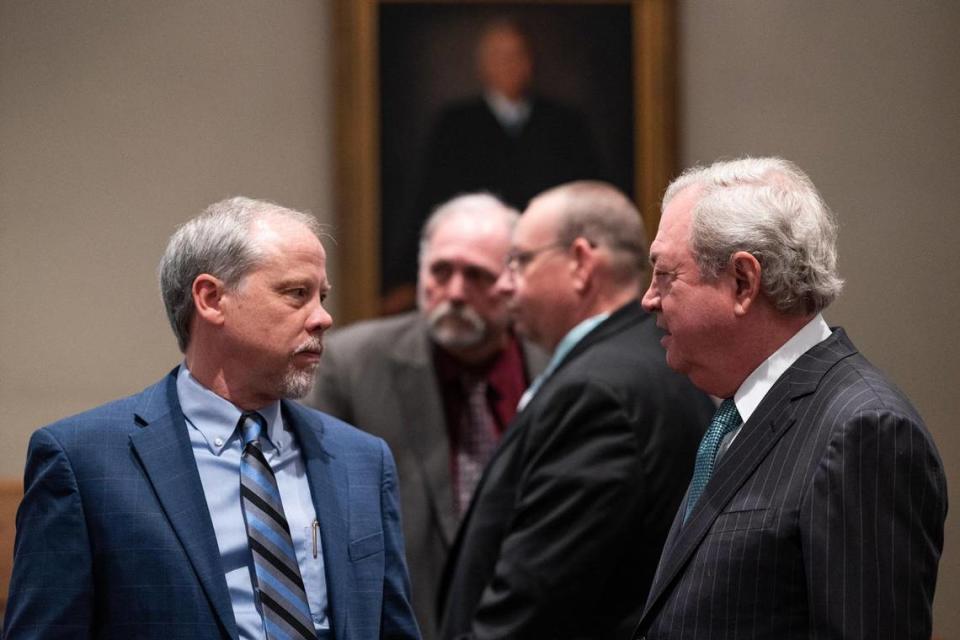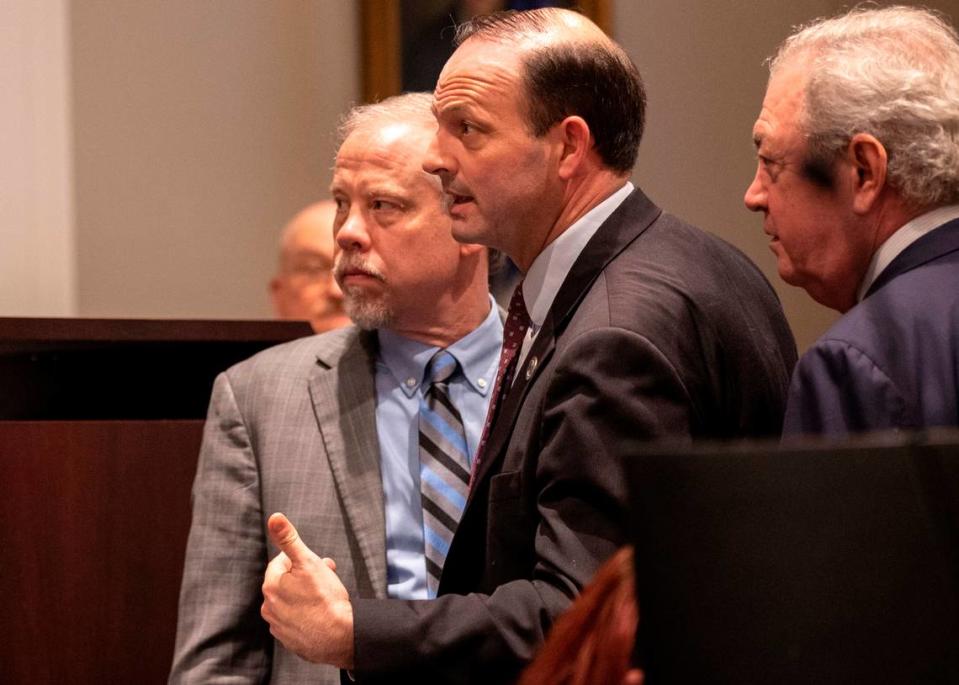‘Family annihilator’ descriptor fit Alex Murdaugh to a T, says SC prosecutor Creighton Waters
The term “family annihilator” was used only twice by South Carolina prosecutors in the six-week trial that resulted in the conviction of former attorney Alex Murdaugh in the murders of his wife and son.
But S.C. Attorney General Alan Wilson and chief prosecutor Creighton Waters said it perfectly describes a rare kind of killer, like Murdaugh.
“Obviously, one of the biggest questions somebody’s going to ask is how could a father do this to his wife and son,” Waters said in a recent sit-down interview with The State Media Co. “As we started to look around, we found there’s actually a recognized phenomenon in criminology called the ‘family annihilator.’ We ultimately reached out to a criminologist who put a term to what we had already identified, and it fit him to a T.”
Both Waters and Wilson sat in separate interviews with a State reporter to talk about what they considered strengths in the state’s case, what’s next as Murdaugh still faces dozens of financial fraud-related charges and what the future holds — for both of them — after the pair prosecuted one of the nation’s highest-profile criminal cases in years.
On March 2, a Colleton County jury took less than three hours to convict Murdaugh, 54, in the grisly shooting deaths of his wife, Maggie, 52, and youngest son, Paul, 22 on the family’s vast rural estate, called Moselle. The trial, which began Jan. 23, was livestreamed daily and watched by millions.
Murdaugh, now serving two consecutive life sentences without parole at a South Carolina prison for double murder, contends he is innocent. His attorneys, Dick Harpootlian and Jim Griffin, are appealing.

The murder trial will be talked about for years, as much for the brutality of the crime — Maggie was killed with an assault type rifle, Paul, with a shotgun — as for other elements of the case.
Murdaugh was a fourth-generation member of a powerful Lowcountry legal family regarded as above reproach. Overwhelming evidence was introduced at trial about his masterful ability to steal millions of dollars unnoticed from those closest to him, including lawyers at his law firm.
In the broad spectrum of killers, ‘family annihilator’ refers to a small bandwidth: a family person, most often a successful man, who is facing the threat of exposure of a hidden life of issues such as drug addiction, debt, criminality. In Murdaugh’s case, all those factors, which he had covered up by a lifetime of lies, were about to unravel, Waters said.
So, in response, he kills family members.
“Are you a family annihilator?” Waters asked Murdaugh during a three-hour cross-examination, without explanation.
“An annihilator? Do you mean did I shoot my wife and son? No,” Murdaugh replied. “I would never hurt Paul or Maggie — under any circumstances.”
Wilson, in his fourth term as attorney general — he was last reelected in November — said he learned about the term “family annihilator” at the trial’s start, sharing the newfound phrase with Waters and veteran co-prosecutor, Don Zelenka. He said the term fit Murdaugh “like a glove.”
“It’s a common sense thing that we had identified before we even knew there was a name for it,” Waters said.
As chief prosecutor, Waters, 52, spent months preparing for the trial, with its intertwined webs of financial and murder evidence, its 62 prosecution witnesses and 14 defense witnesses, even forgoing playing with longtime friends in his Columbia-area rock band, where he is lead guitar.
In preparing to oversee the work of a half-dozen prosecutors and hundreds of witnesses and law enforcement officials, Waters said he read a Stephen Ambrose biography of the late President Dwight Eisenhower, who as a World War II Allied general was in charge of carrying out the complex invasion of France on D-Day in 1944, Waters said.
Among his biggest worries, making sure the state’s dozens of witnesses were ready to testify when called.
“We never let court break down once,” he said.

Trial evidence
There was car and cellphone data. There were spent bullet shells on the estate’s shooting range that matched shells around Maggie’s body. There was devastating testimony from Murdaugh’s friends, sister-in-law and those closest to Paul.
But the publication of a 58-second video found on Paul’s cellphone that contained the voices of Murdaugh, Paul and Maggie at the site of the killings on the property about the time their deaths occurred likely was the state’s strongest piece of evidence.
The video was only found by law enforcement 10 months after the murders June 7, 2021, when investigators finally were able to unlock Paul’s cellphone.
It was particularly compelling because it contradicted numerous false statements by Murdaugh to law officers, family members and friends that he was nowhere near the dog kennels when Paul and Maggie were killed.
It also added to one of Waters’ main theories of the case: Murdaugh lived a life of lies.
‘’Obviously the kennel video was huge. It’s hard to get around being at the scene of the crime with the victims just moments before they die and then lying about it,” Waters said. “Putting your killer at the scene when the victims die — that’s pretty good.”

Yet despite such crucial circumstantial evidence, the absence of specific proof — such as a fingerprint from a murder weapon — that Murdaugh killed Maggie and Paul made introducing evidence showing the financial pressures on Murdaugh even more important, Waters and Wilson said.

 Yahoo Autos
Yahoo Autos 